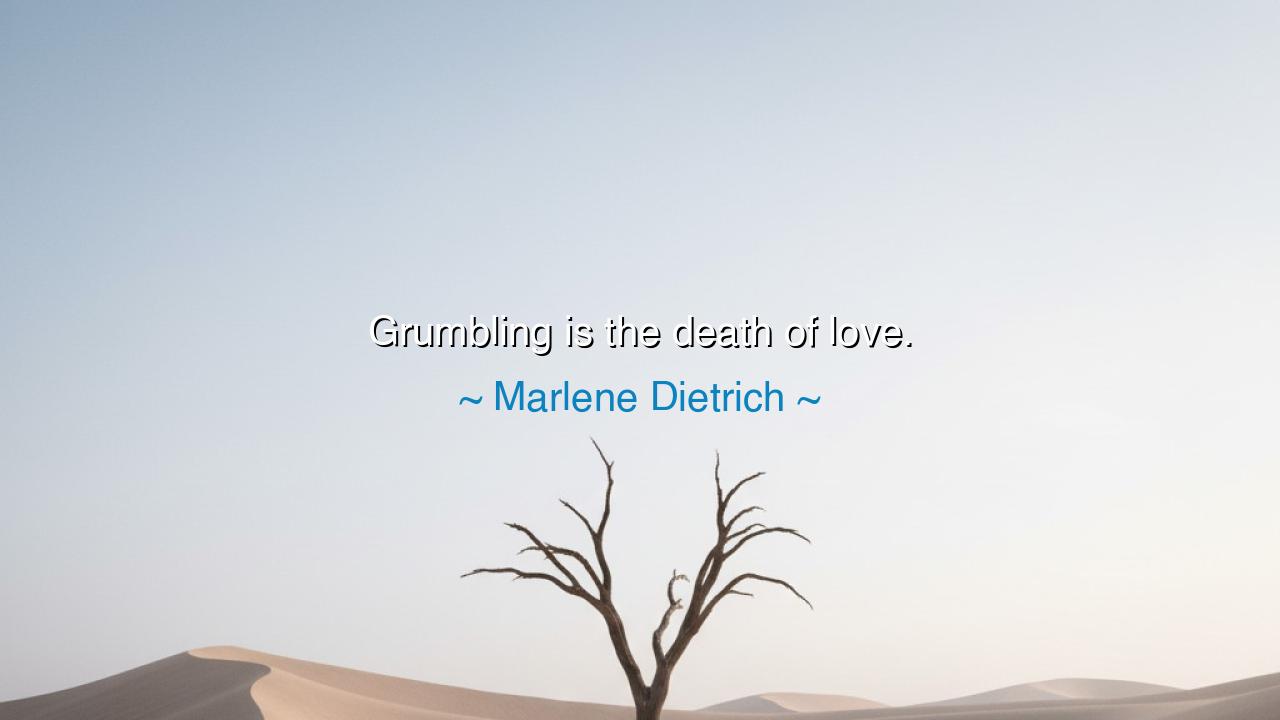
Grumbling is the death of love.






In the piercing and elegant words of Marlene Dietrich, “Grumbling is the death of love,” we find a truth as sharp as it is timeless. It is a simple phrase, yet beneath its brevity lies the weight of centuries of human experience—the slow erosion of affection, the quiet decay of intimacy, the unspoken bitterness that turns tenderness into distance. Dietrich, a woman of deep emotion and observation, spoke not as a philosopher in abstraction, but as one who had lived and loved through passion and loss. Her words are not a condemnation, but a warning: that love does not perish in grand betrayals alone—it often dies in the small, daily murmurs of complaint.
The meaning of her quote rests in understanding the fragile nature of love and the corrosive power of negativity. Grumbling—that constant murmuring of dissatisfaction, that habit of fault-finding—seems harmless at first. It is not rage or cruelty, but something quieter, subtler, and therefore more dangerous. For love, like a flame, needs air and warmth; it cannot survive in the cold shadow of endless complaint. Every sigh, every muttered resentment, every repetition of “not enough” chips away at the joy and gratitude that sustain affection. Love thrives on appreciation and dies in the drought of bitterness. Thus, Dietrich speaks with the authority of one who understood that to keep love alive, one must guard one’s words as carefully as one guards the heart itself.
The origin of this wisdom comes from Dietrich’s own understanding of the human condition—an artist who lived through war, fame, and heartbreak, she had seen both devotion and disillusionment in their rawest forms. In her long and storied life, she understood that love is not destroyed only by conflict or infidelity, but by neglect and complaint. Her insight echoes the wisdom of the ancients: in every age, the poets and philosophers have warned that what is taken for granted eventually fades. The Greek philosopher Epictetus wrote, “He is a wise man who does not grieve for the things which he has not, but rejoices for those which he has.” Dietrich, in her own way, turned this stoic truth toward the realm of the heart. Where there is gratitude, love endures; where there is grumbling, it dies.
Consider the story of Anton Chekhov, the Russian playwright and physician, who understood this truth through both his art and his life. He once said that if two people truly love each other, they must forgive endlessly, for daily life will always bring reasons to complain. In his stories, we see marriages and relationships slowly wither, not because of tragedy or betrayal, but because of weariness and small resentments. The characters begin by grumbling over trifles—the late supper, the forgotten word—and end in estrangement. Chekhov saw what Dietrich later named: that love’s greatest enemy is not storm, but slow corrosion. Those who love must learn to rise above their irritations, lest they mistake habit for honesty and destroy what once was sacred.
The power of Dietrich’s phrase also lies in its spiritual truth. To grumble is to resist gratitude, to dwell on imperfection instead of grace. Love, at its highest form, is not blind, but forgiving—it sees flaws and embraces them. When we complain constantly, we turn away from the divine in one another. The heart that grumbles cannot praise; the tongue that criticizes cannot bless. In this sense, “grumbling” is not just the death of romantic love, but of compassion, kindness, and peace in all forms of relationship—between friends, families, and even nations. It is a warning that the small poison of discontent can undo what even great acts of love have built.
Yet Dietrich’s words are not a command to silence one’s pain or suppress one’s voice. Rather, they call for awareness and balance—to speak truth, but not to dwell endlessly in complaint. There is a difference between honest communication and habitual grumbling. The first heals; the second corrodes. When one loves truly, one learns to correct with gentleness, to speak with the intent to mend, not to wound. The wise lover, like a good gardener, prunes without destroying, tends without tiring, and waters the roots of affection with words of understanding. In this, we see that love is not a mere feeling, but a discipline—a daily choice to nurture rather than neglect.
So, dear listener, let this be your lesson: guard your words and your tone, for they are the threads that bind or unravel the tapestry of love. When you are tempted to grumble, pause and remember what first drew you to the one you love. Recall their goodness before you name their faults. Replace complaint with gratitude, and see how quickly warmth returns. In every relationship, choose to praise more than you criticize, to thank more than you demand. Speak as though your words were the breath that keeps love’s flame alive—because they are.
For as Marlene Dietrich teaches us, love rarely dies in thunder and lightning; it dies quietly, beneath the slow rain of complaint. But it can also be revived—by patience, by gratitude, by silence where there might have been bitterness. To love is to protect not only the heart, but the language of the heart. And when we learn to still the grumbling tongue and open the grateful one, love, like a long-lost melody, begins to sing again.






AAdministratorAdministrator
Welcome, honored guests. Please leave a comment, we will respond soon